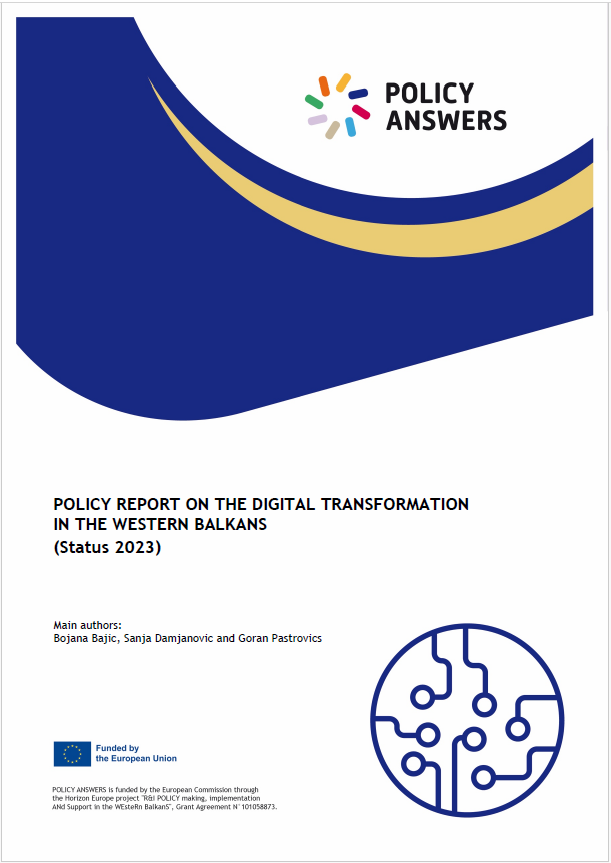This Policy Report presents a comprehensive analysis of the digitalisation landscape in the Western Balkans (WB), addressing various dimensions including ICT infrastructure, skills, governance models, legal frameworks, eGovernment initiatives, and user experience.
It was prepared by Bojana Bajic, Sanja Damjanovic and Goran Pastrovic.
The Policy Report (40 pages) provides an overview on challenges and opportunities, conclusions from workshops held in Sarajevo in September 2023, and assessments for each economy in relation to the EU integration and digitalisation efforts, digital transformation and media as well as the progress along the Digital Compass 2030. The report highlights good practices and recommendations.
The Policy Brief (4 pages) provides an executive summary of the report focusing on the challenges and recommendations.
POLICY ANSWERS presents a snapshot of various aspects of digitalisation, including Information and Communication Technology (ICT) infrastructure, ICT skills, governance models, strategic, legal and regulatory frameworks, eGovernment initiatives, eServices and user experience.
The WB are undergoing a significant transition towards digitalisation, driven by various factors such as globalisation, technological advancements, and the EU integration process. Understanding the current state of digitalisation in the WB, the focus point of this Policy Brief, is crucial for policymakers, stakeholders, and businesses to identify strengths, weaknesses, and areas requiring improvement.
The Policy Brief is based on individual interviews and research conducted for each WB economy.
Additionally, it incorporates the outcome from the World Café discussions held during the Policy Dialogue Conference organised in Sarajevo in 20231. Particular emphasis is on legislation compliance with the EU Acquis and the fulfilment of obligations for its Chapter 10, Digital Transformation and Media2, across all WB economies involved in the negotiation process.
The key findings underscore numerous similarities among WB economies, particularly in their acknowledgment of the interconnected nature of digitising public service deliveries. The WB economies also demonstrate a shared commitment to aligning with EU requirements and standards. However, persistent challenges remain despite progress in developing essential technical and supportive infrastructure and fostering a functional ecosystem. These challenges include the need to adopt missing legislative components and further expand technical infrastructure and the ecosystem to facilitate a more robust implementation of digitalisation initiatives.
While the state of digital transformation varies among WB economies, one commonality persists: the importance of improvement in managing the digital transformation process and the need for clear leadership, both of which are instrumental in accelerating the digitalisation process.
Introducing a new mechanism in the WB region, such as a specific institution for digitalisation (e.g., the National Agency for Information Society in Albania, the Office for Information Technologies and Electronic Government in Serbia), could address this need by attracting top experts, facilitating better strategic planning for digitalisation and enhancing cooperation between policymakers, businesses and citizens. Notably, WB economies that have already established such mechanisms, like Albania and Serbia, have demonstrated significant progress and evident impact. Establishing new mechanisms represents a strategic investment in the future of the WB economies, enabling them to effectively navigate the complexities of the digital age and unlock their full potential for growth and innovation. Involving domestic ICT companies and startups in this process could further bolster the region’s digital transformation efforts.
A central focus of this Policy Brief is the alignment of the WB with the objectives outlined in the Digital Compass for 20303 across four key areas: skills and education, infrastructure, digital transformation of businesses, and digital public services. Understanding the WB’s alignment with these objectives is important for addressing challenges and seeing the full potential of digitalisation in the WB region.

